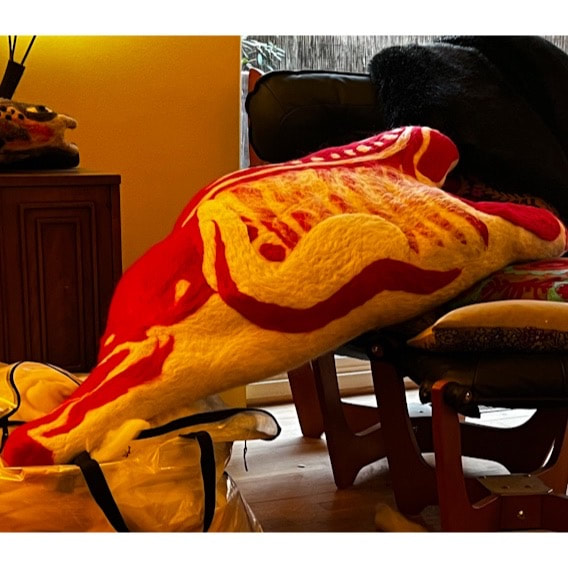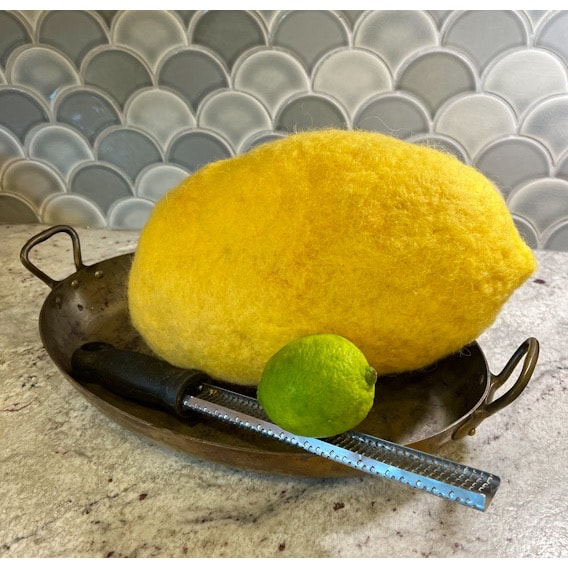A Highway Of Esculents

A Highway Of Esculents
Mimi Sturman
On a cloudless Wednesday, just as the sun rises on Highway 50 in Nevada (known as the loneliest
road in America), a massive exotic bird named Margaret Finn Moore swoops in with lush produce,
fish, and meat. On the ground, collecting the supplies, is a large wolf-like creature named Bella
Eaton.
You may wonder how I know this. Well, I was one of the few humans that was allowed to witness this
marvel with my own eyes. My name is Ursula Dione Flenn. I am a translator and cartographer by
trade, but today I am a truck driver with a purpose. Through a rigorous selection process, I was
chosen to assist in the allocation and transportation of these perishable goods. So here I wait, ready
to load my truck - a privilege really. If not for the food couriers more people would be going without
nourishment. Food shortages still continue but these new sentient beings have taken up the cause,
making food accessible for anyone who is in need.
Human scientists began research on cultivated foods but could not agree on a clear path. Because
the world became more politically, monetarily, and ethically divided, humans got nothing
accomplished. So, the work was left to others.
Testing on animals and insects was a normal part of research, but one day in the human lab the ants
escaped and started devouring the test samples. The effects were astounding, not only did the ants
grow in size but also in intellect. With singular focus and unemotional verve, these arthropods
became scientists. As well as cultivating food, they grew new breeds of animals and birds who came
to be known as The Food Couriers.
Three ants ran the lab in the United States. Not only were they scientists but also chefs and
gourmands. Instead of the standard lab coats, these ants wore white aprons which were less
restrictive on their rigid arms. I had the pleasure of meeting Lila Hoist, Rebecca Donleavey, and Sadie
Reece, who introduced me to their work. The hostess of the trio, Sadie, offered me a meal of lab
grown foods, which was very tasty and beautifully presented. The ants were truly dexterous and
placed the food with tweezer-like precision on lovely cobalt blue plates. I will never forget it.
As distribution became more widespread, humans became more reasonable, sensible, and calm. I
have learned a lot from this experience. Food is essential, but it is also about beauty
Mimi Sturman
On a cloudless Wednesday, just as the sun rises on Highway 50 in Nevada (known as the loneliest
road in America), a massive exotic bird named Margaret Finn Moore swoops in with lush produce,
fish, and meat. On the ground, collecting the supplies, is a large wolf-like creature named Bella
Eaton.
You may wonder how I know this. Well, I was one of the few humans that was allowed to witness this
marvel with my own eyes. My name is Ursula Dione Flenn. I am a translator and cartographer by
trade, but today I am a truck driver with a purpose. Through a rigorous selection process, I was
chosen to assist in the allocation and transportation of these perishable goods. So here I wait, ready
to load my truck - a privilege really. If not for the food couriers more people would be going without
nourishment. Food shortages still continue but these new sentient beings have taken up the cause,
making food accessible for anyone who is in need.
Human scientists began research on cultivated foods but could not agree on a clear path. Because
the world became more politically, monetarily, and ethically divided, humans got nothing
accomplished. So, the work was left to others.
Testing on animals and insects was a normal part of research, but one day in the human lab the ants
escaped and started devouring the test samples. The effects were astounding, not only did the ants
grow in size but also in intellect. With singular focus and unemotional verve, these arthropods
became scientists. As well as cultivating food, they grew new breeds of animals and birds who came
to be known as The Food Couriers.
Three ants ran the lab in the United States. Not only were they scientists but also chefs and
gourmands. Instead of the standard lab coats, these ants wore white aprons which were less
restrictive on their rigid arms. I had the pleasure of meeting Lila Hoist, Rebecca Donleavey, and Sadie
Reece, who introduced me to their work. The hostess of the trio, Sadie, offered me a meal of lab
grown foods, which was very tasty and beautifully presented. The ants were truly dexterous and
placed the food with tweezer-like precision on lovely cobalt blue plates. I will never forget it.
As distribution became more widespread, humans became more reasonable, sensible, and calm. I
have learned a lot from this experience. Food is essential, but it is also about beauty
